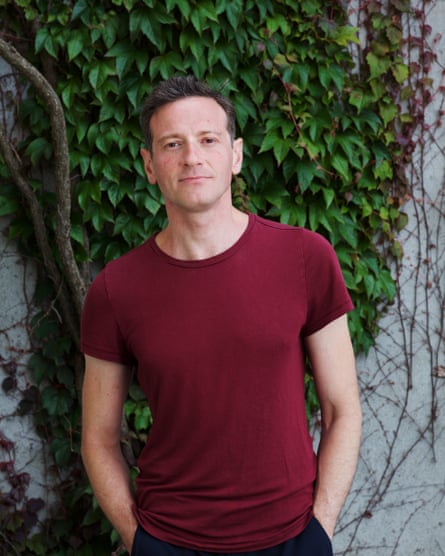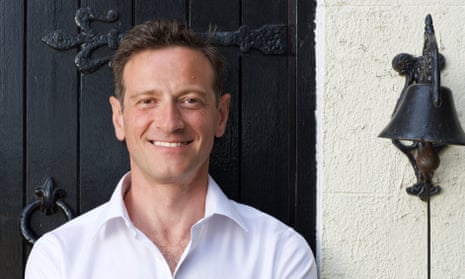Giovanni Frazzetto speaks with a thin voice, barely louder than our footsteps; we are walking around St Stephen’s Green in Dublin. To hear, I have to lean in. At first I think he’s shy, but he’s an intimacy expert so maybe talking quietly is a device to bring us closer. After all, there is a loneliness epidemic and Frazzetto is on a mission to make human beings do intimacy better.
To this end, his new book, Together, Closer: Stories of Intimacy in Friendship, Love and Family, examines the way humans relate to each other across a spectrum of relationships from parent-child to platonic friendships and, of course, romantic love. Frazzetto, a research fellow at Trinity College Dublin, is a cross-disciplinary neuroscientist. He wants to explain the neuroscience behind the way people relate to each other, to explain why we behave as we do.
If you catch yourself flinching at this point, you may be exhibiting one particularly common behaviour: our reluctance to confront our emotional lives. “Oh intimacy!” Frazzetto says, mimicking a standard response: “I don’t want to talk about it!” If he can only “unlock” some relationship tropes, he says, people might become more at ease with the subject, with themselves, with their expectations – and evolve a more constructive emotional style.
So what does Frazzetto mean by “intimacy”? The book variously describes it as a risk, a journey, or the inner rooms of a large mansion. It can develop over years or flourish in a moment and fade, as when strangers connect on the train. The concept seems elusive. Frazzetto nods. “Speaking personally, it means ‘deep knowledge of someone else – knowledge that another person would not have.’” People who share intimacy “can understand each other without verbalising, in a way that other people don’t have access to”.
So our true identities are revealed to each other? “Yes, and you know why?” Frazzetto asks. “When two people come together, in the romantic realm, they function as a mirror for each other. I’m convinced of that.” Intimacy, when it really works, means self-knowledge, too. “You look at this person and it’s like looking at yourself in the mirror – and you don’t look away.” He mentions a friend who gave him an amusingly apposite definition. They were having dinner after he’d finished the book and she said: “Oh intimacy: In-to-me-I-see.”
Frazzetto’s book starts with the story of Anita, a single woman in her 40s who has devised a fantasy boyfriend to stem her overbearing mother’s inquiries into her failure to marry. She would like to wear a T-shirt with the slogan LONELINESS KILLS and has “fragments of compulsive behaviour. She is fearful,” Frazzetto says. Every now and then, the story pauses so the author can explain the science behind her behaviour. The effect is a little like a colour picture morphing into a diagram and then back to a brighter, sharper photograph.
Anita is alone, and one reason for this, Frazzetto explains, is her abundance of choice. He cites research that presented shoppers with a choice of a few jars of jam or 24 jars. Customers who were offered the reduced choice were more likely to make a purchase. In the same way, he writes: “Anita gave the impression of being available … But she was also difficult when it came to choosing. Suitors who came her way were never the right ones.” She is “a victim and accomplice of the choice overload”.
Other chapters examine Carrie and Aidan, married for 35 years, who have evolved a sort of code by which to communicate privately in public. Through them, Frazzetto explores how intimacy builds across different timescales, in milliseconds and years. Then there is Liam who throws the odd sop to intimacy to Scott in an otherwise ungiving dynamic. It’s “an intimate arrangement” rather than true intimacy, because neither is honest with himself or the other. Vanessa and Ryan are both married to other people, but have been enjoying a loving affair together for years. In another chapter, Lev is a withholder who has to overcome his selfishness and self-consciousness to give freely.
Crucially, the book performs a sleight of hand in relation to all these tales. The reader reads the stories of others’ lives but, of course, we are really appraising our own. Every now and then – and where this happens will depend on your intimate style – the text seems to silver into a kind of mirror. It is unnervingly accurate the way this works, and triggers an interior scrutiny. In these characters, Frazzetto is really showing us ourselves, helping us to look at what we usually look away from.
The stories are treated like case studies, but some raise questions. There is a high incidence of chance. Carrie boards the tube carriage where Aidan is sitting; Lev and Fionn share a birthday; Liam divines which bit of ocean is the right one to bump into Scott mid-dip.
I had assumed that Frazzetto had fictionalised the stories of real people, but he says they are “made-up characters, composite figures” whose stories he has based on the science behind different emotional styles and intimacy. He hopes that fiction will flesh out the science and that readers will respond to the way Scott leaves Liam, or how Margo decides to live an open life. “This is something they will remember more than the anterior cingulate cortex,” he says, and who is going to argue with that?
His first book, How We Feel, contained an element of memoir, but the fictionalisation is a surprising discovery – and no doubt that speaks well of the proficiency with which Frazzetto moves in and out of his characters’ heads. However, it also feels estranging. The people whose lives I was appraising are figments. I knew them less well than I thought, which feels – oddly – like a loss of intimacy.
Frazzetto, 40, says there is a little bit of himself in all the stories. He was born in Francofonte in Sicily and lived there until he was 18, when he moved to London to study molecular biology at UCL. Certainly the places where he has lived – London, Berlin, just outside Dublin and Sicily – trace a personal path through all of the stories. Like the character of Anita, he says, he was single in Berlin. He was single while he wrote the book. And now? He laughs. “Still single!”

Given his expertise in intimacy, and the fact that he would like a settled relationship, I wonder if being alone makes him anxious. “I don’t feel that because I get older there will be fewer chances,” he says. “How do I make my life so that I interact with the right kind of people, with whom I can develop an affinity that is just there, and needs no effort or explanation? That’s the responsibility that I feel for myself. I say to myself, ‘Well, what I can do is to be passionate about things. Carry on, and the rest will happen. It’s not about searching.’”
The book’s final chapter tells the story of Margo and Maurice. Frazzetto’s sister, back in Sicily, is ill, and her illness has drawn attention to the precariousness of life – both hers and Frazzetto’s. It is for this reason, he says, that this final chapter, entitled Yes, feels most personal. In the book, Maurice dies of an Aids-related illness and Margo has to survive that loss. But both characters lived in a way that opened them to intimacy. At parties, Maurice’s favourite question was, “What’s your passion?” – which Frazzetto says he used to ask people “and it drove everyone mad”.
Maurice and Margo pin a sign inside their apartment door: “No More Bullshit!” That phrase is “something I used to joke about with friends of mine”, Frazzetto says. “I used to tell them, ‘Remember – NMBS!’ when they were going for partners who did not return their feelings. They kept going for that, following certain patterns and not respecting themselves very much.”
How would Frazzetto answer Maurice’s question? What is his passion? “I could say learning foreign languages, the sea, cooking, writing …” he replies. “But there is an overarching passion that keeps me alive. That is love, understood as a condition in which I can be an inspiration, make someone feel happy and special, and in turn, feel understood and driven. I function better if I am in that condition of love, and I try to cultivate that daily.”
For those whose intimacy skills could benefit from exercise, Frazzetto believes it is possible to retrain. But how? He stops walking and turns to face me. “We are equipped to have it, we are equipped to connect to people and if for some reason we have forgotten how to do it, or we are not used to it any more, we can go back a few steps and try again.”
Intimacy derives from knowing what you are passionate about. “Discover the things that make you, that give you joy, and say, ‘I want to find intimate connections within this context,’” he advises. “I like … kayaking, for instance, so I’ll join a kayaking club,” he suggests.
I worry that lonely people don’t join kayaking clubs. They Google kayaking clubs and then follow all the kayakers on Twitter.
“From a neuroscience point of view, it’s all about training yourself,” Frazzetto says. “Push away intrusive thoughts – ‘I’m lonely, nobody likes me, nobody is supposed to like me.’ Thoughts that are not exactly real and are constructed by yourself through this framework of loneliness. We get used to that way of thinking. But the neurons will get used to the new one if we try … This is how things happen for every skill that we learn.” In practical terms, this would mean not only going to the kayaking club, but asking the kayakers out for a drink.
Other steps are closer to hand. Phone instead of texting. Look at people when you talk to them. Consider what they say, what they say first, and what you were expecting them to say. Spot your own patterns of behaviour that block intimacy and work to amend them. Treat the book – like an intimate relation – as a mirror. Who knows, it might reflect what you would not otherwise see. And if you can see it in yourself, you might be able to show it to someone else.

Comments (…)
Sign in or create your Guardian account to join the discussion